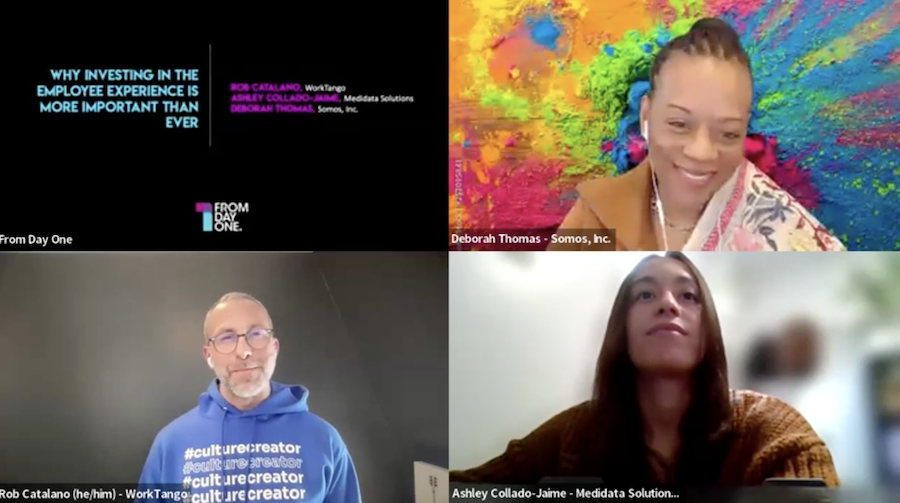Why Investing in the Employee Experience Is More Important Than Ever


“We’re coming to times where promotions are not going to be as available. How can I make you feel happy here on a day-to-day basis, especially when a year may come where you may not see that next step?” This is the question Ashley Collado-Jaime, people operations manager at Medidata Solutions, posed to From Day One’s audience in a webinar about investing in the employee experience.
With tighter budgets and fewer resources, people leaders face the challenge of creating more holistic and sustainable strategies, and more of them recognize measuring ROI goes beyond the scope of using metrics alone.
Deborah Thomas, chief people officer at Somos, Inc., shared a similar approach to providing support and gathering feedback using focus groups, surveys, exit surveys, and more to understand the employee experience: “We engage employees in solutioning with us, and as we’re building these experiences, we leverage their voices every step of the way.”
Employee engagement and satisfaction equally predict potential long-term success. More business leaders will consider investing in initiatives, with measurable and immeasurable results for key talent retention.
Quantifying the Benefits
Moderator Rob Catalano, chief engagement officer at WorkTango, a platform improving the employee experience and boosting retention using engagement software such as employee surveys, inquired about effectively requesting investment in experience initiatives.
“Given the significance of today’s workplace where maybe it's hard to find those levels of investment, how do you approach the next steps? How do you approach securing a budget?” Catalano asked.
Collado-Jaime says that survey metrics prove what strategies deliver results. The participation numbers must justify requesting additional investment in employee experience programs. When retention rates declined in groups with lower participation, the numbers correlated.

“It goes back to the data looking at our retention rates compared to who was being recognized,” Collado-Jaime said. “We saw that with our retention rates within lower participating groups. Something is missing here and people aren’t feeling as appreciated.”
Thomas builds on presenting numbers as evidence, discussing the effectiveness of benchmarking, and using employee survey metrics. By revealing how Somos financially exceeded its peer organizations, Thomas could request investment in DEI and other employee engagement initiatives.
Sustainability of the Employee Experience
Investing in the employee experience has implications for the business, employees, and leaders.
As companies continue to set goals amidst increasing financial constraints, open communication, engagement, and recognition are critical to meeting modern-day business goals. “There is a big wellness and burnout issue in organizations today for a lot of the things we just described, asking people to do more with fewer resources and higher expectations,” Catalano said.
Collado-Jaime discussed Medidata Solutions’ quarterly manager roadshows to assist hiring managers in developing programs to boost team engagement. These roadshows incorporate training webinars and open communication channels. Feedback from the hiring managers throughout the process helps HR leaders improve programs and make new development and retention strategies.
At Somos, Inc., the success of its career pathing program relies on testimonials from leaders. Based on employee survey data revealing that teams wanted to hear directly from their leaders instead of HR, Thomas shared how their recognition program revealed an opportunity to promote engagement through leaders fostering performance appraisal discussions within the program.
Catalano noted how both companies adopted a more holistic experience inclusive of employees and leaders alike. This approach and leadership perspective helped build stronger, more engaged teams, thus cultivating a more sustainable business.
The Qualitative Benefits
The panelists discussed the usefulness of employee experience initiatives, irrespective of whether they can be proven ROI. Collado-Jaime emphasized that an employee with a positive experience allows that company to promote it as a specific experience that other companies may not offer.
Thomas used DEI as an example of an initiative with benefits not easily proven ROI. She recounted Somos, Inc. celebrating Holi as a cultural recognition of their South-Asian employees and saw 75% of their participation. The quality of their experience is immeasurable through a business-oriented lens.
The employee experience is pivotal to a sustainable business and yields more effective results than short-term cost-saving initiatives and measures. “We can have AI, technology, and all of those things,” Thomas said. “but ultimately people make those things happen.”
Editor's note: From Day One thanks our partner, WorkTango, for sponsoring this webinar.
Stephanie Reed is a freelance news, marketing, and content writer. Much of her work features small business owners throughout diverse industries. She is passionate about promoting small, ethical, and eco-conscious businesses.
The From Day One Newsletter is a monthly roundup of articles, features, and editorials on innovative ways for companies to forge stronger relationships with their employees, customers, and communities.